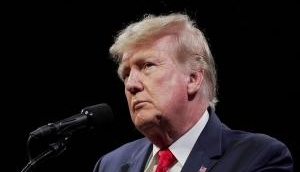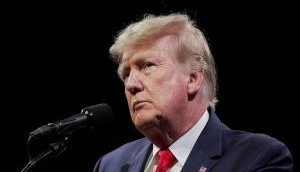What Trump’s every-country-for-itself rhetoric gets wrong about Davos

There is a disarming and almost touchingly naive belief among the presenters and the government delegations in the cloistered mountain village of Davos that “creating a shared future in a fractured world” – the title of this year’s World Economic Forum – is actually possible.
To the outside world, the panels and speeches fleetingly catch the news cycle, doing little to alter the perception that it’s just a gathering of elites and billionaires. But inside the forum, political leaders mingle with entrepreneurs, scientists and humanists. It’s a menagerie of power, money, brains and innovative thinking mainly, though not exclusively, being channeled toward social good.
So what happens when the “leader of the free world” walks into the room and promotes a form of isolationism as his recommended method for creating that shared future?
Universal values meets ‘America First’
Like Trump, this year was my first at Davos. But my reason for being there was markedly different.
As the director of the University of Southern California’s Shoah Foundation, I was invited to present “new dimensions in testimony,” a collaborative project that aims to bring the stories of Holocaust and other genocide survivors to three-dimensional life by using articial intelligence to simulate a conversation.
On a typical day teaching on Holocaust and genocide, I would never have the chance to speak with Iraqi clerics or Saudi journalists. The distance is just too great physically, intellectually and emotionally.
Not so at Davos. In the last few days, for example, I have had detailed conversations with members of the United Arab Emirates government who agreed that Holocaust testimony could be used to teach universal human values at home. Davos allows such boundaries to be crossed.
Enter Donald Trump, the “America First” president whose rhetorical track record at first glance seems at odds with the Davos globalists. In a keynote address on Jan. 26, Trump chose his words carefully and stuck to the script, ostensibly encouraging collaboration.
“Together let us resolve to use our power, our resources and our voices, not just for ourselves but for our people, to lift their burdens, to raise their hopes and to empower their dreams,” he said.
Trump described himself as America’s “cheerleader,” but the effect was more salesman, as he anchored his speech in the revival of the American economy, reassuring investors that their money is safe with him.
While Trump’s critics saw his speech as out of touch, the globalist gathering at Davos is known for embracing a broad spectrum of political, social and fiscal perspectives. It could be argued that Trump’s rumbustious isolationist rhetoric adds a healthy disruption to the remarkably polite company at Davos, but it is also a fact that the United States is by no means the only power here, a point not lost on the Davos die-hards.
An invitation to isolation
More to the point, it was not what he did say but what he did not that was so at odds with the tenor of the forum.
Trump focused on the fiscal performance of his country but said nothing about the shared global values at the heart of this year’s forum. Trump’s thesis is that if every country looks after its own interests, then ultimately common outcomes will prevail. This flies in the face of the hard work leaders in government, business, academia and others have put in at Davos this year to create multilateral agreements on key issues of global security, such as international efforts to tackle climate change.
While most leaders who attend also speak to their own country’s interests, only Trump promoted a “my country first” brand of isolationism.
Even his invitation for delegates to visit America, as generous as it sounds, is disingenuous, as some – such as the delegates from Chad and Iran I have been working with this week – cannot get visas because of his travel ban. Trump’s insistence that “putting America first” is his duty as president – just as other heads of state must do so in their own countries – ignores the many political leaders at Davos, such as France’s Emmanuel Macron or Germany’s Angela Merkel, who were genuinely trying to find shared interests at the forum.
Trump and even a few of the Davos delegates may believe that his administration’s policies, such as corporate tax cuts, deregulation and increased military spending, do in fact create the “shared future” promoted by the forum. The reality is doing so requires a less self-interested strategy, one that doesn’t put “America first.”
In other words, his claim that “America First does not mean America alone” rings hollow.
Rather, the goal of a shared future was being met elsewhere at Davos, such as in a conversation I had with Salih Al-Hakeem, a cleric and director of the Hikmeh Center for Dialogue and Cooperation in Iraq, who lost his entire family during the Saddam Hussein regime. I watched Al-Hakeem as he listened to the interactive testimony of Holocaust survivor Pinchas Gutter describing the destruction of his family by the Nazis.
After interacting with the holographic Gutter, he invited the real one to visit Iraq to tell his story to Muslims there. Al-Hakeem then turned to me and said, “When he speaks about the Holocaust he speaks for all of us.”
![]() That for me is the Davos not seen in the glare of the cameras. Call me naive, but it just might help create a more shared future in an otherwise fractured world.
That for me is the Davos not seen in the glare of the cameras. Call me naive, but it just might help create a more shared future in an otherwise fractured world.
Stephen D. Smith, Director of Shoah Foundation, University of Southern California – Dornsife College of Letters, Arts and Sciences
This article was originally published on The Conversation. Read the original article.
First published: 29 January 2018, 17:31 IST





![BJP's Kapil Mishra recreates Shankar Mahadevan’s ‘Breathless’ song to highlight Delhi pollution [WATCH] BJP's Kapil Mishra recreates Shankar Mahadevan’s ‘Breathless’ song to highlight Delhi pollution [WATCH]](https://images.catchnews.com/upload/2022/11/03/kapil-mishra_240884_300x172.png)

![Anupam Kher shares pictures of his toned body on 67th birthday [MUST SEE] Anupam Kher shares pictures of his toned body on 67th birthday [MUST SEE]](https://images.catchnews.com/upload/2022/03/07/Anupam_kher_231145_300x172.jpg)






